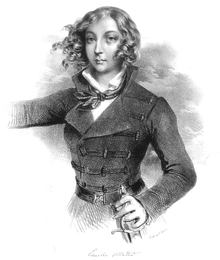Countess Emilia Plater | |
|---|---|
 Emilia Plater, anonymous 19th-century engraving | |
| Coat of arms | Plater coat of arms |
| Born | 13 November 1806 Vilnius, Russian Empire |
| Died | 23 December 1831 (aged 25) Justinavas Manor, Congress Poland |
| Buried | Kapčiamiestis |
| Noble family | Plater |
| Father | Franciszek Ksawery Plater |
| Mother | Anna von der Mohl (Anna z Mohlów) |
| Military career | |
| Allegiance | Polish–Lithuanian insurgents |
| Years of service | 1831 |
| Rank | Captain |
| Unit | Lithuanian 25th Infantry Regiment |
| Battles / wars | November Uprising |
Countess Emilia Broel-Plater (Lithuanian: Emilija Pliaterytė; 13 November 1806 – 23 December 1831) was a Polish–Lithuanian noblewoman and revolutionary[1] from the lands of the partitioned Polish–Lithuanian Commonwealth. Raised in a patriotic tradition in Līksna near Daugavpils, she fought in the November Uprising of 1830–1831 against the Russian Empire. She raised a small unit, participated in several engagements in present-day Lithuania, and received the rank of captain in the Polish insurgent forces. When the main forces under the General Dezydery Chłapowski decided to cease fighting and cross into Prussia, Plater vowed to continue the fight and wanted to cross into Poland where the uprising was still ongoing. However, she fell ill and died.
She was a leader in an uprising and her story became widely publicized and inspired a number of works of art and literature. A maiden warrior, she is a national heroine in Poland, Lithuania and Belarus. She has been venerated by Polish artists and by the nation at large as a symbol of women fighting for the national cause. She has been referred to as the Lithuanian[2] or Polish[3][4] Joan of Arc.[5]
- ^ Cite error: The named reference
morganwas invoked but never defined (see the help page). - ^ Cite error: The named reference
plikunewas invoked but never defined (see the help page). - ^ Fidelis, Malgorzata (21 June 2010). Women, Communism, and Industrialization in Postwar Poland. Cambridge University Press. pp. vii. ISBN 978-0-521-19687-1.
- ^ Phillips, Ursula (2009). "Apocalyptic Feminism: Adam Mickiewicz and Margaret Fuller". The Slavonic and East European Review. 87 (1): 1–38. doi:10.1353/see.2009.0168. ISSN 0037-6795. JSTOR 25479322. S2CID 151371263.
- ^ Vitkūnas, Manvydas (2018). "Эмилия Плятер в исторической памяти литовцев". Vēsture: avoti un cilvēki (in Russian). Retrieved 1 July 2022.